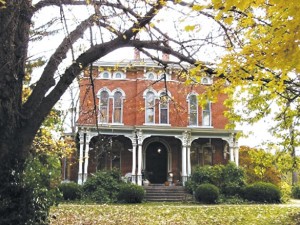“I know of nothing better than to settle in the vicinity of Indianapolis, which is undoubtedly destined to be one of the largest cities of the Middle West, and where we shall be accessible to society, libraries and lectures,” said George W. Julian about his decision to build a home in Irvington. Standing today at 115 S. Audubon is the Italianate style brick house that Julian had built in 1873; “It is spacious and bright, with a quality of dignity.”
While the house had ten rooms, the room on the right beyond the high arched front doorway — the library — was “the heart of the house.” With butternut woodwork and glass covered shelves “that reach to the ceiling,” the room held hundreds of books, none more valuable than the Congressional Globe (the forerunner of the Congressional Record) that held the official account of the proceedings of the United States Congress and the record of service of the Hon. George W. Julian, United States Representative from Wayne County, Indiana. Few Hoosiers of the 19th century contributed more to the well-being of all Americans than George Washington Julian. As an ardent abolitionist, promoter of free settlement of public lands, and a tireless advocate of African-American and women’s suffrage, Julian helped to shape the modern democracy of the United States.
George W. Julian was born on May 5, 1817 near the Wayne County town of Centerville in the year following Indiana statehood. His parents, Isaac and Rebecca Hoover Julian were devout Quakers who had moved to Indiana from North Carolina because they had an ardent aversion to slavery. When Julian was six years old his father died, and his mother, with her strong will and deep faith, became the principle influence in his life. His education in the local schools was typical of that available in the pioneer period, and he supplemented it by his desire to read whatever book he could lay his hands on.
He taught for a short time before deciding to study law. After he was licensed to practice law, he soon returned to Centerville and formed a brief partnership with his older brother, Jacob Julian. In the spring of 1845 George W. Julian married Ann Finch, and later that year he was elected a state representative as a member of the Whig Party to the Indiana General Assembly. During his term, Julian spoke out firmly against capital punishment and supported a plan to settle the state’s debt. Two years later after failing to get the Whig Party nomination for state senator, Julian became more active in the anti-slavery movement. In 1848 he helped organize the Free Soil Party and attended the first women’s rights convention in Seneca Falls, New York. He also began to embrace Unitarianism.
Julian was elected on the Free Soil ticket as a United States Representative from Wayne County in 1849 and served in the 31st Congress. He ran unsuccessfully for re-election in 1850. Julian was nominated for vice president of the United States by the Free Soil Party in 1852, and in 1854 he joined others opposing the extension of slavery in founding the Republican Party.
In 1860 Julian was once again elected a United States Representative, and would serve five terms. Before assuming office, he experienced a personal tragedy when his wife died. Julian remarried in 1863 to Laura Giddings. On entering upon his Congressional duties, Julian was named chair of the Committee on Public Lands and was instrumental in the passage of the Homestead Act of 1862. Julian was also a member of the Joint Committee on the Conduct of the War where he advocated for a vigorous prosecution of the Civil War. Julian pushed for the adoption of the Thirteenth Amendment to the Constitution abolishing slavery, and he was the author of the Fifteenth Amendment to the Constitution that extended voting rights to African-American men. Julian favored a punitive reconstruction of the South following the end of the war. In 1868 Julian proposed the first Constitutional amendment to grant women suffrage.
After Julian failed to secure the nomination for another term in Congress, he moved to Irvington. He continued to write and speak out in favor of civil rights and women’s suffrage as a Liberal Republican and later as a Democrat. In 1884 his wife died, and the following year Julian again was called to public service when President Grover Cleveland named him surveyor-general of the New Mexico Territory. In this capacity Julian resolved old Spanish land claims and confronted land speculators known as the “Santa Fe Ring.” With the election of Benjamin Harrison, Julian was not re-appointed surveyor-general and he returned to his Irvington home. Among the noted visitors George W. Julian received in his home during his retirement years were Susan B. Anthony and Sojourner Truth. He died on July 9, 1899 and was buried in Crown Hill Cemetery. In 1930 the Irvington School, Indianapolis Public School No. 57, was renamed in his honor. George W. Julian was “a vigorous and effective servant of the people” and an “honest man and true to his convictions.” He was an “eloquent speaker,” a “forceful writer,” and a “powerful champion” of the causes he favored.
Julian’s daughter, Grace Julian Clarke, continued to live in this south Audubon house after her father’s death. She was a noted leader of the women’s franchise movement and of women’s clubs. Following her death in 1938, 115 S. Audubon eventually became a locally owned nursing home — Huff’s Sanatorium. Today, the George W. Julian House is a private residence.
A commemoration of the 200th birthday anniversary of George W. Julian will be held at the Irvington Branch Public Library on Saturday, May 6 with a display and panel discussion presented by the Indiana Historical Bureau and the Irvington Historical Society. All are invited to this 1:00 p. m. celebration. Refreshments will be served.



